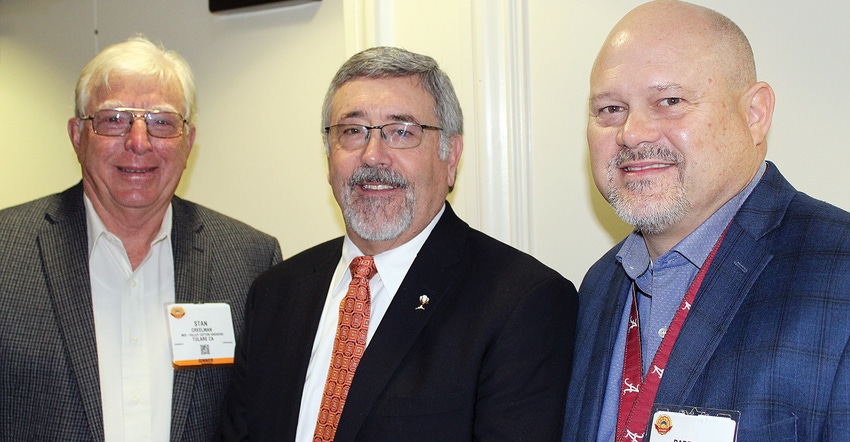
National Cotton Council leaders are pleased with the inclusion of cotton as a Title I program crop in new disaster legislation, but they are continuing to push for short-term assistance in the form of a ginning cost-share program.
The new seed cotton program included in the continuing resolution Congress passed last month will help growers in the long term, says Council Chairman Ron Craft. But some producers need immediate help so they can arrange financing for their 2018 crops.
“Throughout 2017, the Council was very active on numerous fronts in addressing the industry’s priorities,” Craft said in a speech at the Mid-South Farm and Gin Show in Memphis, Tenn. “Our primary focus, though, has been on successfully addressing the economic challenges that face our industry.”
During 2017, he said, the Council conducted an “extensive and coordinated effort” of petitioning the White House to authorize implementation of a gin cost-share program on an ongoing basis until the new farm bill is put in place. Those efforts had not produced results as of early March.
Former Agriculture Secretary Tom Vilsack originated the idea for and developed the gin cost-share program in about a four-month span in 2016. The program helped many producers finish out their 2016 crop when payments for the 2015 ginning costs arrived in August of that year (2016).
Council officials have not commented on why the program has not been renewed on a timely basis, but other sources have pointed to opposition by the White House Office of Management and Budget as the chief obstacle.
Next farm bill
The Council’s efforts on the next farm bill have been much more rewarding.
“The Council also pursued inclusion of cotton in an ARC/PLC program through the appropriations process to bring cotton back into Title I ahead of the next farm bill,” said Craft, a cotton ginner from Plains, Texas, who became Council chairman at its annual meeting last month.
“In that regard, we greatly appreciate Congress’ passage earlier this month of a supplemental disaster bill that includes policy that establishes seed cotton’s eligibility in the Title I ARC/PLC programs of the farm bill. The U.S. cotton industry is very appreciative of the strong leadership of Sen. Thad Cochran of Mississippi and Rep. Mike Conaway of Texas that made it possible to advance this important policy through the House and Senate.”
(There were reports Agriculture Secretary Sonny Perdue might announce a new gin cost share program for cotton when he spoke at the Gin Show on Saturday, March 3. The NCC conducted an educational seminar on the seed cotton program at the Gin Show on Friday.)
Craft said the need for cotton’s eligibility for Title I support programs and the implementation of a ginning cost-share program for the 2016 crop were underscored during the tour of the Texas Gulf Coast by Secretary Perdue and House Agriculture Committee Chairman Conaway, which followed Hurricane Harvey last summer.
“During this tour, Perdue and Conaway also traveled to west Texas and met with leaders from the Council and Lamesa Cotton Growers, where we emphasized these same points and discussed other issues confronting cotton.”
2018 priorities
Craft listed the following priorities for the National Cotton Council in 2018:
Continuing the work to secure short-term economic assistance for cotton producers;
Educating producers about the new seed cotton program and closely monitoring USDA’s implementation of the program;
Advancing the Council’s farm policy recommendations during the development of the next farm bill;
Maintaining beneficial trade agreements and policies, while addressing unfair trade practices;
Reversing burdensome regulations, while preserving critical crop protection products;
Securing funding for the industry’s priorities in the annual appropriations process; and
Ensuring the industry has a “well-funded political action committee for advancing cotton priorities with our nation’s lawmakers.”
“The Council will continue its focus on improving cotton flow, eliminating lint contamination through research and industry education programs, and further enhancing U.S. cotton’s sustainability message through the work of the COTTON USA Sustainability Task Force,” Craft said.
“The Council has also been very active on the trade front, ranging from the re-negotiation of NAFTA, China’s market access, and cotton discussions at the WTO ministerial in Argentina.”
Craft said the NCC also has been working on numerous regulatory issues, including continued close involvement on pollinator protection activities, active support for the registration and re-registration of critically important crop protection products.
“In addition, we have been working closely with the National Cotton Ginners Association as well as state and regional gin associations to address the FDA’s animal feed rule that could affect certain gins and require costly assessments and controls to be put in place with respect to cottonseed,” he said.
Craft said he was looking forward to working with Mike Tate, who was elected as the Council’s vice chairman. A producer from Huntsville, Ala., Tate is scheduled to become chairman after Craft completes his term in 2019. He served the past two years as the chairman of the American Cotton Producers.
Following passage of the continuing budget resolution, the NCC conducted informational conference calls and webinars regarding provisions of the 2018 seed cotton farm program.
About the Author(s)
You May Also Like






